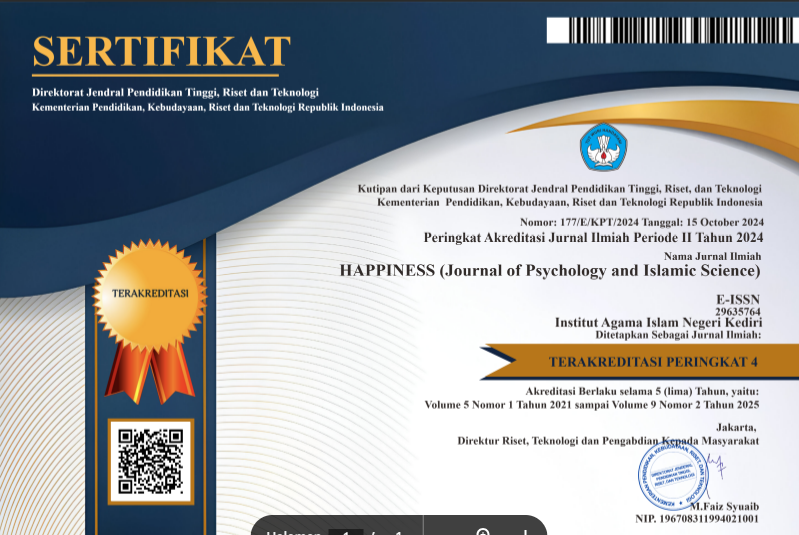Examining Prosociality in a Sample of Undergraduates in North-Central Nigeria: The Roles of Psychological Wellbeing, Emotional Intelligence and Perceived Self-Esteem
DOI:
https://doi.org/10.30762/happiness.v9i1.2612Keywords:
Psychological wellbeing, emotional intelligence, self-esteem, prosocial behaviour, undergraduatesAbstract
This study examined the roles of psychological wellbeing, emotional intelligence and perceived self-esteem on prosociality in a sample of undergraduates at the University of Ilorin, Kwara State, North-Central Nigeria. Adopting cross sectional survey design, 347 undergraduates from the University were conveniently sampled for this study. The age range of participants from 18 to 28 [M=19.8; SD=3.0] and they responded to standardized measures of Psychological Wellbeing Scale [α = .88], Emotional Intelligence [α = .85], Rosenberg Self-esteem Scale [α = .89] and Prosocial Behaviour Scale [α = .84]. Four hypotheses were formulated and tested. The result indicated that the independent variables; psychological wellbeing [β = .261, p > .05], emotional intelligence [β = .147, p > .05] and self-esteem [β = .255, p > .05] predicted prosocial behaviour. The joint contributions of all predictor variables were also significant [R2= .075, t = 5.096; p < .05]. Based on the findings of this study it was recommended that university management should lay emphasis on learning process to promote psychological wellbeing, emotional intelligence, self-esteem and prosocial behaviour among the students. Training programmes for effective development of the psychological wellbeing, self-esteem and emotional intelligence of the students should be designed to develop their emotional and social skills.
Downloads
References
Afolabi, O. A. & Owoola, M. O. (2014). Influence of self-efficacy, self-esteem and risk-taking behavior on prosocial behavior among commercial drivers. Contemporary Journal of Applied Psychology, 1 (2), 1-13.
Afolabi, O. A. & Idowu, E. O. (2014). Influence of gender, spiritual involvement/belief and emotional stability on prosocial behaviour among some Nigerian Drivers. Canadian Social Science, 10(1), 1-7.
Aronson, A. C., Wilson, G. B., & Akert, H. O. (2004). Prosocial behaviour in modern times: Implications and benefits. Oak books, New Jersey, 67-78.
Bhavikatti, V. (2023). The role and importance of emotional intelligence in knowledge management. International Journal for Multidisciplinary Research. 5. 1-4. https://doi.org/10.36948/ijfmr.2023.v05i05.6864
Bierhoff, H. W. (2002). Prosocial behaviour. 1st Edition. Imprint Psychology Press. https://doi.org/10.4324/9780203989425, pp. 1-400. Accessed from: https://www.blackwellpublishing.com/content/hewstonesocialpsychology/chapters/chapter9.pdf
Brackett, M. A., Lopes, P. N., Ivcevic, Z., Mayer, J. D., & Salovey, P. (2004a). Integrating emotion and cognition: The role of emotional intelligence. In D. Dai & R. J. Sternberg (Eds.), Motivation, emotion, and cognition: Integrating perspectives on intellectual functioning (pp. 175-194). Mahwah, NJ: Lawrence Erlbaum
Brackett, M. A., Mayer, J. D., & Warner, R. M. (2004b). Emotional intelligence and its relation to everyday behaviour. Personality & Individual Differences, 36, 1387–1402.
Bradbum, N. M. (1969). The structure of psychological well-being. NORC. Aldine Publishing Company: Chicago.
Cecily, I. M., & Jebaraj, J. S. (2017). Self-esteem in relation to academic achievement among higher secondary students. International Journal of Research - Granthaalayah. 5. 27-32. https://doi.org/10.5281/zenodo.574859.
Dhanabhakyam, M., & Sarath, M. (2023). Psychological wellbeing: A systematic literature Review. International Journal of Advanced Research in Science, Communication & Technology, 3(1), 1-4, 603-607. https://doi.org/10.48175/IJARSCT-8345.
Eisenberg, N. & Fabes, R. A. (1990). Empathy: Conceptualization, measurement, and relation to pro-social behavior. Motivation & Emotion, 14(2): 131-149.
Eisenberg, N. (2006). Pro-social behaviour. In G. G. Bear & K. M. Minke (Eds.), Children’s needs III: Development, prevention, and intervention (313–324). Washington, DC.
Eisenberg, N., & Fabes, R. A. (1991). Prosocial behavior and empathy: A multi-method, developmental perspective. In P. Clark (Ed.), Review of personality and social psychology 12, (3), 34-61. Newbury Park, CA: Sage.
Eisenberg, N., & Fabes, R. A., (1998). An Economic analysis of pro-social behaviour." Dissertation.
Eisenberg, N., &, Murphy, B. C., (2008). Consistency and development of pro-social dispositions: A longitudinal study. Child Development, 70(6): 1360-1372.
Eisenberg, N., Cumberland, A., Guthrie, I. K., Murphy, B.C. & Shepard, S. A. (2005). Age changes in prosocial responding and moral reasoning in adolescence and early adulthood. Journal of Research on Adolescence,75(3),235-260.
Eisenberg, N., Fabes, R., Spinrad, T. (2007). Prosocial development. Handbook of Child Psychology. doi:10.1002/9780470147658.chpsy0311. ISBN 978-0-470-14765-8.
Fu, X., Padilla-Walker, L. & Brown, M. (2017). Longitudinal relations between adolescents' self-esteem and prosocial behavior toward strangers, friends and family. Journal of Adolescence. 57. 90-98. https://doi.org/10.1016/j.adolescence.2017.04.002.
Garaigordobil, M. (2009). A comparative analysis of empathy in childhood and adolescence: Gender differences and associated socio-emotional variables. International Journal of Psychology & Psychological Therapy,9, (2), 23-29.
Goleman, D. (1998). Emotional intelligence: Ability or Trait. Routledge Publishers, 33-79.
Hay, D., & Nye, R. (2006). The spirit of the child. Jessica Kingsley Publishers, 89-95.
Hewitt, J. P. (2009). The social construction of self-esteem. In Lopez, Shane J.; Snyder, C.R. (eds.). Oxford Handbook of Positive Psychology. Oxford University Press. pp. 217–224.
Huppert, F. A. (2009). Psychological well-being: Evidence regarding its causes and consequences: Applied psychology. Health & Well-Being, 1(2),137-164.
Kruk, M. E., Gage, A. D., Arsenault, C., Jordan, K., Leslie, H. H., Roder-De,Wan, S., Adeyi, O., Barker, P., Daelmans, B., Doubova, S. V., English, M., García-Elorrio, E., Guanais, F., Gureje, O., Hirschhorn, L. R., Jiang, L., Kelley, E., Lemango, E. T., Liljestrand, J,, Malata, A., Marchant, T., Matsoso, M. P., Meara, J. G., Mohanan, M., Ndiaye, Y., Norheim, O. F., Reddy, K. S., Rowe, A. K., Salomon, J. A., Thapa, G., Twum-Danso, N. A.Y., Pate, M. (2018) High-quality health systems in the Sustainable Development Goals era: Time for a revolution. Lancet Global Health, 6(11):e1196-e1252. https://doi.org/10.1016/S2214-109X(18)30386-3
Laible, D., Carlo, G., & Roesch, S. C. (2004). Pathways to self-esteem in late adolescence: The role of parent and peer attachment, empathy, and social behaviours. Journal of Adolescence. 27, (2), 703-716.
Latane, R. & Darley, B. (1970). Social cognitive perspectives on prosocial behaviour: The mediating influence of social reasoning abilities, interpersonal understanding, and problem-solving competencies. SAGE Publications, 45-89.
Marian de Souza, E. A. (2009). Spirituality and well-being. International Journal of Children's Spirituality,14(3),181-184.
Mayer, J. D., & Salovey, P. (1997). What is emotional intelligence? In P. Salovey & D. Sluyter (Eds.), Emotional development and emotional intelligence: Implications for educators, 3-31. New York: Basic Books.
Martí-Vilar, M., Trejos-Gil C. A, & Betancur-Arias, J. D. (2022). Emotional Intelligence as a Predictor of Prosocial Behaviors in Spanish and Colombian Older Adults Based on Path Models. Healthcare (Basel), 10(2):284. doi: 10.3390/healthcare10020284. PMID: 35206898; PMCID: PMC8871891.
Okurame, D. E. (2002). Psychosocial factors in mentoring formation and career outcomes of mentorship among first- line management workers. An unpublished Ph.D thesis. University of Ibadan, Nigeria.
Olmos-Gómez, M. D. C, Ruiz-Garzón, F., Azancot-Chocron, D., & López-Cordero, R. (2023). Prosocial behaviour axioms and values: Influence of gender and volunteering. Psicologia: Reflexão e Crítica, 10;36(1):16. https://doi.org/10.1186/s41155-023-00258-y.
Omisola, E. & Mosaku, K., & Fatunbi, A. (2022). Influence of self-esteem and susceptibility to peer pressure on psychological wellbeing of in-school adolescents. Nigerian Journal of
Penner, L. A., Dovidio, J. F., Piliavin, J. A., & Schroeder, D. A. (2005). Prosocial behavior: multilevel perspectives. Annual Review of Psychology 56:365-92. https://doi.org/10.1146/annurev.psych.56.091103.070141.
Perry, D. V. & Bussey, O. B. (2004). Prosocial behaviour: Cultural determinants. Journal of Abnormal Psychology, 4(1), 23-29.
Pfattheicher, S., Nielsen, Y., & Thielmann, I. (2021). Prosocial behavior and altruism: A review of concepts and definitions. Current Opinion in Psychology, 44. https://doi.org/10.1016/j.copsyc.2021.08.021.
Ryff, C. D. (2014). Psychological well-being revisited: Advances in the science and practice of eudaimonia. Psychotherapy & Psychosomatic, 83(1):10-28. https://doi.org/10.1159/000353263.
Ryff, C. D. (1989). Happiness is everything, or is it? Explorations on the meaning of psychological well-being. Journal of Personality & Social Psychology, 57(6), 1061-1081.
Schutte, N. S., Malouff, J. M., Simunek, M., McKenley, J., & Hollander, S. (2002). Characteristic emotional intelligence and emotional well‐being. Cognition & Emotion, 16(6), 769–785. https://doi.org/10.1080/02699930143000482
Thoits, A. P., & Hewitt, N. L. (2001). Volunteer work and well-being. Journal of Health & Social Behavior, 42, 115–131.
Van Willigen, M. (2000). Differential benefits of volunteering across the life course. The Journal of Gerontology: Series B, Psychological Sciences & Social Sciences, 55(5), 308–318.
Weinstein, N. & Ryan, R. M. (2010). When helping helps: Autonomous motivation for prosocial behavior and its influence on well-being for the helper and recipient. Journal of Personality & Social Psychology, 98(2), 222–244.
Wymer, W. W. (1997). Segmenting volunteers using values, self-esteem, empathy, and facilitation as determinant variables. Journal of Non-Profit & Public Sector Marketing, 5(2), 3-28.
Downloads
Published
How to Cite
Issue
Section
License
Copyright (c) 2025 Agesin Bamikole Emmanuel, Olaseni AO

This work is licensed under a Creative Commons Attribution-ShareAlike 4.0 International License.





















